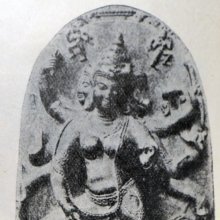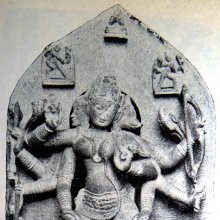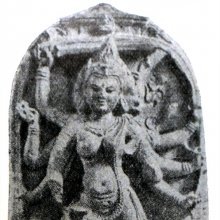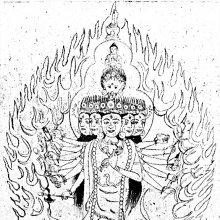Ashtabhujapita, Aṣṭabhujapīta, Ashtabhuja-pita: 1 definition
Introduction:
Ashtabhujapita means something in Buddhism, Pali. If you want to know the exact meaning, history, etymology or English translation of this term then check out the descriptions on this page. Add your comment or reference to a book if you want to contribute to this summary article.
The Sanskrit term Aṣṭabhujapīta can be transliterated into English as Astabhujapita or Ashtabhujapita, using the IAST transliteration scheme (?).
Images (photo gallery)
In Buddhism
Tibetan Buddhism (Vajrayana or tantric Buddhism)
Source: archive.org: The Indian Buddhist IconographyAṣṭabhujapīta (अष्टभुजपीत) refers to the eight-armed variety of Mārīcī: one of the various emanations of Vairocana, as mentioned in the 5th-century Sādhanamālā (a collection of sādhana texts that contain detailed instructions for rituals).—[...] It is very curious that almost all the images of Mārīcī known so far, belong to this Variety. In actual images, a legless lady charioteer may sometimes be met with instead of Rāhu, while some images retain the charioteer as well as Rāhu.
The eight-armed variety of Mārīcī is also known as Mārīcīpicuvā (or Aṣṭabhujamārīcī).

Tibetan Buddhism includes schools such as Nyingma, Kadampa, Kagyu and Gelug. Their primary canon of literature is divided in two broad categories: The Kangyur, which consists of Buddha’s words, and the Tengyur, which includes commentaries from various sources. Esotericism and tantra techniques (vajrayāna) are collected indepently.
See also (Relevant definitions)
Partial matches: Ashtabhuja, Pita.
Full-text: Marici, Maricipicuva.
Relevant text
Search found 1 books and stories containing Ashtabhujapita, Aṣṭabhujapīta, Ashtabhuja-pita, Aṣṭabhuja-pīta, Astabhuja-pita, Astabhujapita; (plurals include: Ashtabhujapitas, Aṣṭabhujapītas, pitas, pītas, Astabhujapitas). You can also click to the full overview containing English textual excerpts. Below are direct links for the most relevant articles:
The Indian Buddhist Iconography (by Benoytosh Bhattachacharyya)



